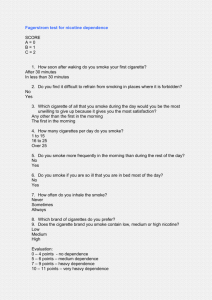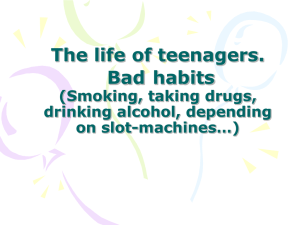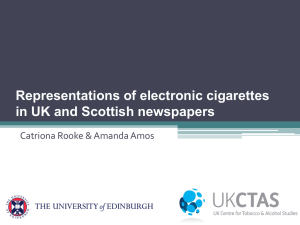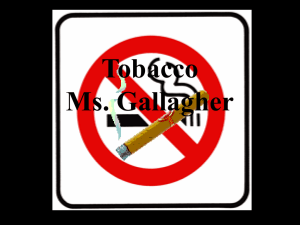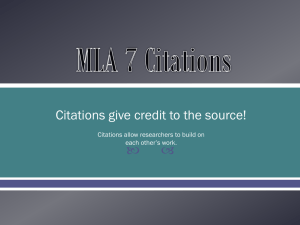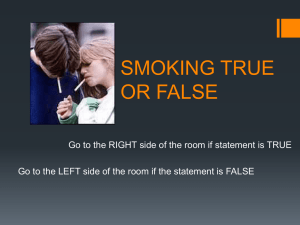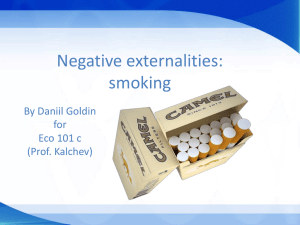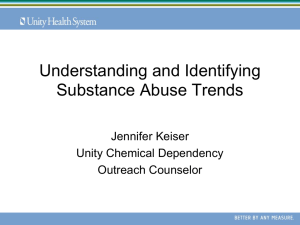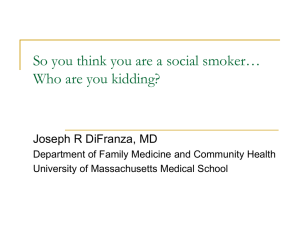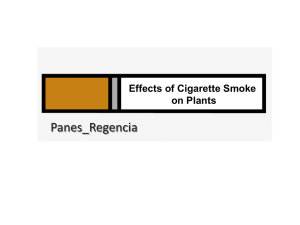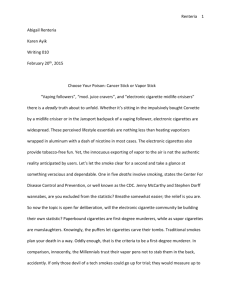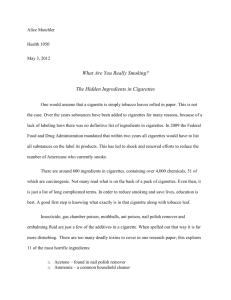Smoking PowerPoint Handouts
advertisement
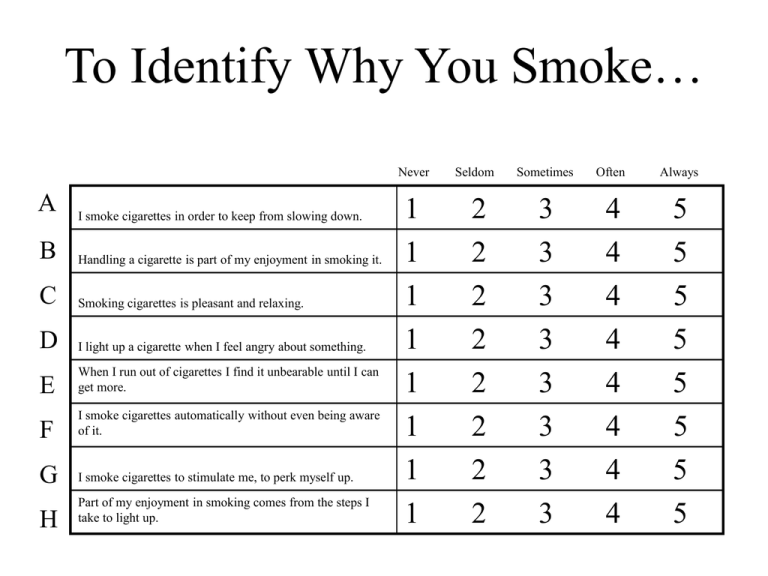
To Identify Why You Smoke… Never A I smoke cigarettes in order to keep from slowing down. B Handling a cigarette is part of my enjoyment in smoking it. C Smoking cigarettes is pleasant and relaxing. D I light up a cigarette when I feel angry about something. E When I run out of cigarettes I find it unbearable until I can get more. F I smoke cigarettes automatically without even being aware of it. G I smoke cigarettes to stimulate me, to perk myself up. H Part of my enjoyment in smoking comes from the steps I take to light up. 1 1 1 1 1 1 1 1 Seldom 2 2 2 2 2 2 2 2 Sometimes Often Always 3 3 3 3 3 3 3 3 4 4 4 4 4 4 4 4 5 5 5 5 5 5 5 5 Never I I find cigarettes pleasurable. J When I feel uncomfortable or upset about something, I light up a cigarette. K When I’m not smoking a cigarette, I’m very much aware of it. L I light up a cigarette without even realizing I still have one burning in the ashtray. M I smoke cigarettes to give me a lift. N When I smoke, part of the enjoyment is watching the smoke as I exhale it. Seldom Sometimes Often Always When I feel down or want to take my mind off cares and worries, I smoke a cigarette. 1 1 1 1 1 1 1 1 2 2 2 2 2 2 2 2 3 3 3 3 3 3 3 3 4 4 4 4 4 4 4 4 5 5 5 5 5 5 5 5 Q I get a real gnawing hunger for a cigarette when I haven’t smoked for a while. 1 2 3 4 5 R I’ve found a cigarette in my mouth and not remembered putting it there. 1 2 3 4 5 O P I want a cigarette most when I am comfortable and relaxed. A G M Total: Stimulation D J P Total: Crutch B H N Total: Handling E K Q Total: Craving/Addiction C I O Total: Pleasure/Relaxing F L R Total: Habit TO IDENTIFY WHY… STIMULATION - You feel that smoking gives you energy and keeps you going. Think about alternatives that give you energy such as brisk walking and jogging. HANDLING - There are a lot of things you can do with your hands without lighting up. Use a “worry rock”, a pencil or Chinese Health Balls. PLEASURE / RELAXING - Obviously, you get a lot of physical pleasure out of smoking. Various forms of exercise, such as cycling, can be effective alternatives. CRUTCH - Finding cigarettes very comforting in moments of stress can make quitting tough. Returning to smoking can create a sense of failure, which can be stressful itself. There are ways of beating the crutch problems. CRAVING / ADDICTION - In addition to a physical nicotine dependency, you have a psychological addiction to tobacco. It’s hard, but you can break this addiction. HABIT - If cigarettes are part of your routine and not much else, quitting should be relatively easy. One key to success is being aware of every cigarette you smoke. The 4-D Solution 1. Drink Water: This flushes the nicotine and other chemicals out of your system faster. Temporarily, it also satisfies the oral craving. Drink plenty of water. 2. Deep Breathing: Take a few deep breaths. Hold the last one. Exhale slowly. Take a deep breath break instead of a cigarette break. 3. Delay: As a smoker you were not always in control. You smoked when your body needed nicotine. By delaying, you are calling the shots. You are in control. 4. Do Something Different: When a craving hits, it is good to get out of your present situation. Change activities. Talk to someone. Step outside for a moment. Do something different. Stage 3 ~ Quitting Checklist I had to learn how to smoke ~ I will take time to learn how not to smoke I have seriously thought it over and am ready to quit Make a personal commitment to myself to quit Pick a date for quitting completely Write my personal reasons for quitting on a card Carry that card with me and refer to it Record where and when I have a cigarette ~ decide which cigarettes are really important to me and which are not Remove some of my least important cigarettes Make smoking less comfortable ~ change brands; carry in a different place; smoke with the other hand Create substitutes for my most important cigarettes Stage 4 ~ Quitting Checklist Remove all cigarettes and accessories Use my cigarette substitution activities The craving to smoke will only last a few minutes ~ distract myself Drink plenty of fluids, especially water Adapt my eating habits to accommodate a potential weight gain Withdrawal effects are common ~ remind myself of why I am quitting Have a friend I can count on for support Consider an exercise program ~ physical activity can be beneficial Avoid places where smoking is allowed Be aware that the desire to smoke can be linked to situations, people and emotional states If I relapse, it’s okay ~ return to being a non-smoker immediately SYMPTOM CAUSE DURATION RELIEF Irritability Body’s craving for nicotine 2-4 weeks Walks, hot baths, relaxation techniques Fatigue Nicotine is a stimulant 2-4 weeks Take naps, do not push yourself Insomnia Nicotine affects brain wave functions and influences sleep patterns 1 week Cough Dry throat Nasal drips Body gets rid of mucus which has blocked airways a few days Lack of Body needs time to adjust concentration to not having a constant stimulation from nicotine a few weeks Avoid caffeine in PM, relaxation techniques, occasional sleeping pills Drink plenty of fluids Plan workload accordingly, avoid additional stress, reduce workload SYMPTOM CAUSE Dizziness Body is getting extra oxygen Tightness in the chest Tension is created by the body’s need for nicotine; may be caused by sore muscles from coughing DURATION RELIEF 1-2 days Take extra caution, change positions slowly a few weeks Relaxation techniques, especially deep breathing Gas Intestinal movement decreases for a brief Constipation Stomach pains period 1-2 weeks Drink plenty of fluids, add roughage to diet Hunger Craving for a cigarette can be confused with hunger; mouth desires stimulation 2-4 weeks Drink fluids, eat low calorie snacks, chew gum Craving for a cigarette Withdrawal from nicotine, a strongly addictive drug 2-3 days Wait out the urges, Occasionally for they only last a few months or years minutes; distract yourself Stage 5 ~ Quitting Checklist Remember, quitting is a long-term process Look forward to not thinking about smoking and the attachment Write a list of benefits on a card and refer to it Never think I can safely have even a puff or two Plan in advance for unique events that might stimulate urges, such as a wedding or holidays Think positively about the turning point I have reached Be confident in my new choices and reactions to tense situations Keep my list of alternatives handy – remain prepared Save the $$ normally spent on cigarettes and TREAT MYSELF Feel good about the health benefits Feel good about the example I am setting for others Maintain contact with my supportive friends
